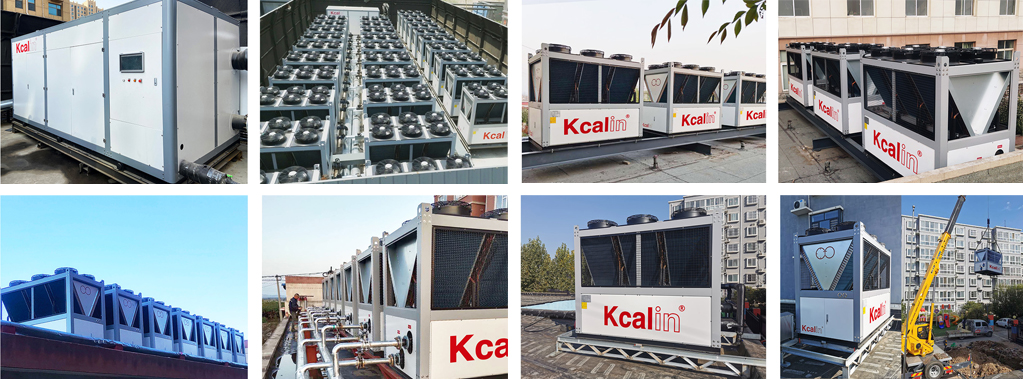In today's era of pursuing energy efficiency and environmental protection, heat pump technology has become a popular choice in fields such as heating, refrigeration, and hot water supply. Air cooled heat pump units and water cooled heat pump units are two common heat pump systems, which have some differences in working principles, applicable scenarios, and performance characteristics.
Working principle
Air cooled heat pump unit: The air cooled heat pump unit uses air as the heat exchange medium. They suck in air through outdoor fans and then exchange heat through the refrigerant in the heat pump system, extracting heat energy from the outdoor air. This method makes air-cooled heat pumps suitable for heating and cooling under various climatic conditions.
Water cooled heat pump unit: Unlike air cooled heat pumps, water cooled heat pump units use water as the heat exchange medium. They emit heat through water coolers or cooling towers, transferring heat energy to water. Water cooled heat pumps typically require a water circulation system, including water pumps and cooling equipment. This makes them more suitable for specific heating and cooling needs.
Applicable scenarios
Air cooled heat pump units: Air cooled heat pump units are suitable for the heating and cooling needs of most regions, especially in situations where climate conditions change significantly or require rapid installation.
They are commonly used in residential, commercial buildings, small industrial facilities, and short-term activities such as tent heating or outdoor activity cooling.
Water cooled heat pump units: Water cooled heat pump units are typically used in high energy consumption situations such as large commercial buildings, industrial process cooling, and equipment cooling, as they perform better in terms of large-scale heat demand.
These units typically require stable water sources, making them more suitable for locations with reliable water supply in the region. They are also commonly used in environments that require long-term heating and cooling.

Performance characteristics
Air cooled heat pump units: Relatively speaking, the installation and maintenance of air cooled heat pump units are relatively simple because they do not require complex water circulation systems. In extremely cold environments, the performance of air-cooled heat pumps may be affected because the thermal energy in the air is limited. Since they do not require a large amount of water, air-cooled heat pumps have an advantage in areas with scarce water resources.
Water cooled heat pump units: Water cooled heat pumps typically perform better in terms of high efficiency performance, as water has a higher thermal conductivity and can transmit heat more effectively. These units have relatively stable performance in extremely cold climates and are not affected by significant fluctuations in temperature. Due to the need for water coolers or cooling towers, the installation and maintenance of water-cooled heat pumps are usually complex and require professional water treatment and cooling systems.
Energy efficiency
Air cooled heat pump units: Air cooled heat pumps typically have slightly lower energy efficiency under partial load conditions, as their performance is affected by outdoor temperature. However, under suitable climatic conditions, air-cooled heat pump units can still provide efficient heating and cooling.
Water cooled heat pump units: Water cooled heat pumps typically exhibit more stability and higher energy efficiency under various climatic conditions, as the cooling effect of water is relatively uniform. They are suitable for large-scale thermal demand and can maintain efficiency in long-term operation.
Maintenance and operating costs
Air cooled heat pump units: The maintenance cost of air cooled heat pumps is usually lower because their systems are relatively simple. These units do not require additional water treatment and cooling systems, reducing operating costs.
Water cooled heat pump units: The maintenance cost of water cooled heat pump units may be higher as they require regular maintenance of water coolers, cooling towers, and water circulation systems. The operating costs of water-cooled heat pumps may be affected by the supply and treatment costs of water resources.
There are significant differences between air-cooled heat pump units and water-cooled heat pump units in terms of working principles, applicable scenarios, performance characteristics, energy efficiency, maintenance and operating costs, and environmental impact. Choosing a heat pump system that is suitable for specific needs depends on various factors, including climate conditions, energy efficiency, water availability, and budget considerations. Taking these factors into account comprehensively can help decision-makers better choose suitable heat pump systems to meet their needs and achieve energy efficiency and environmental protection goals. Regardless of the type of heat pump unit chosen, sustainable and efficient solutions can be provided for areas such as heating, cooling, and hot water supply.







Comment